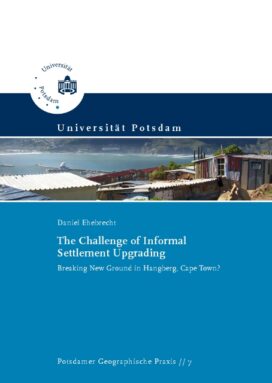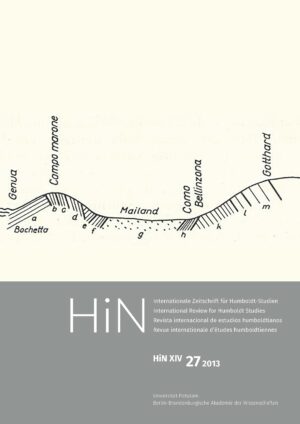Trotz vieler Herausforderungen und Beschränkungen gilt das Konzept des in situ upgrading informeller Siedlungen als eine der wichtigsten Herangehensweisen an die Wohnraumkrise im „globalen Süden“. Aufgrund seiner immanenten Prinzipien einer schrittweisen Entwicklung an Ort und Stelle, der Vermeidung von Umsiedlungen, dem Erhalt lokaler Existenzgrundlagen sowie demokratischer Beteiligung und Kooperation, wird oftmals angenommen, dass diese Herangehensweise nachhaltiger ist, als eine quantitativ ausgerichtete Wohnraumversorgung und Top-Down-Planungsansätze. Während diese Studie die Vorteile des in situ upgrading nicht in Frage stellt, zielt sie darauf ab, Probleme der praktischen Umsetzung dieses Ansatzes in einem spezifischen nationalen und lokalen Kontext zu identifizieren. Die Studie diskutiert die Herkunft und die Bedeutung des in situ upgrading auf der Grundlage einer Rückschau auf die Entwicklung internationaler Wohnraumpolitik und analysiert den politischen und sozialen Kontext der Einbettung dieses Ansatzes in die südafrikanische Wohnraumpolitik. Darüber hinaus macht sie sich Einblicke einer kürzlich durchgeführten Fallstudie in Kapstadt zunutze, um Probleme und Konflikte zu erfassen, die bei der Umsetzung des in situ upgrading in einem komplexen lokalen Kontext entstehen können. Auf dieser Grundlage werden die Vorteile wie auch die Beschränkungen des in situ upgrading näher spezifiziert und zentrale Voraussetzungen für eine erfolgreiche Umsetzung des Konzeptes formuliert.
Breaking new ground in Hangberg, Cape Town?
ISBN: 978-3-86956-300-8
184 pages
Release year 2015
Series: Potsdamer Geographische Praxis , 7
12,50 €
Non-taxable transaction according to § 1 (1) UStG/VAT Act in combination with § 2 (3) UStG/VAT Act a. F. Providing this service, the University of Potsdam does not constitute a Betrieb gewerblicher Art/Commercial Institution according to § 1 (1) No. 6 or § 4 KStG/Corporate Tax Act. If the legal characterization of our business is changed to a commercial institution subsequently, we reserve the right to invoice VAT additionally. zzgl. Versandkosten
Trotz vieler Herausforderungen und Beschränkungen gilt das Konzept des in situ upgrading informeller Siedlungen als eine der wichtigsten Herangehensweisen an die Wohnraumkrise im „globalen Süden“. Aufgrund seiner immanenten Prinzipien einer schrittweisen Entwicklung an Ort und Stelle, der Vermeidung von Umsiedlungen, dem Erhalt lokaler Existenzgrundlagen sowie demokratischer Beteiligung und Kooperation, wird oftmals angenommen, dass diese Herangehensweise nachhaltiger ist, als eine quantitativ ausgerichtete Wohnraumversorgung und Top-Down-Planungsansätze. Während diese Studie die Vorteile des in situ upgrading nicht in Frage stellt, zielt sie darauf ab, Probleme der praktischen Umsetzung dieses Ansatzes in einem spezifischen nationalen und lokalen Kontext zu identifizieren. Die Studie diskutiert die Herkunft und die Bedeutung des in situ upgrading auf der Grundlage einer Rückschau auf die Entwicklung internationaler Wohnraumpolitik und analysiert den politischen und sozialen Kontext der Einbettung dieses Ansatzes in die südafrikanische Wohnraumpolitik. Darüber hinaus macht sie sich Einblicke einer kürzlich durchgeführten Fallstudie in Kapstadt zunutze, um Probleme und Konflikte zu erfassen, die bei der Umsetzung des in situ upgrading in einem komplexen lokalen Kontext entstehen können. Auf dieser Grundlage werden die Vorteile wie auch die Beschränkungen des in situ upgrading näher spezifiziert und zentrale Voraussetzungen für eine erfolgreiche Umsetzung des Konzeptes formuliert.
Recommended Books
-
 2018
2018Ottmar Ette, Reinhard Andress, Vicente Durán Casas, Dagmar Hülsenberg, Eberhard Knobloch, Ulrich Präßler, Thomas Schmuck, Werner Sundermann
Alexander von Humboldt im Netz ; 19 (2018) 36
23,50 €Non-taxable transaction according to § 1 (1) UStG/VAT Act in combination with § 2 (3) UStG/VAT Act a. F. Providing this service, the University of Potsdam does not constitute a Betrieb gewerblicher Art/Commercial Institution according to § 1 (1) No. 6 or § 4 KStG/Corporate Tax Act. If the legal characterization of our business is changed to a commercial institution subsequently, we reserve the right to invoice VAT additionally.
zzgl. Versandkosten
Add to cart -
 2019
2019Ottmar Ette, Cathleen Buckow, Petra Gentz-Werner, Eberhard Knobloch, Bernd Kölbel, Steffen Kölbel, Ulrike Leitner, Herbert Pieper, Katrin Sauerwein, Michael Sauerwein, Ingo Schwarz, Christian Suckow
Alexander von Humboldt im Netz ; 9 (2008) 16
10,50 €Non-taxable transaction according to § 1 (1) UStG/VAT Act in combination with § 2 (3) UStG/VAT Act a. F. Providing this service, the University of Potsdam does not constitute a Betrieb gewerblicher Art/Commercial Institution according to § 1 (1) No. 6 or § 4 KStG/Corporate Tax Act. If the legal characterization of our business is changed to a commercial institution subsequently, we reserve the right to invoice VAT additionally.
zzgl. Versandkosten
Add to cart -
 2019
2019Ottmar Ette, Carolina Depetris, Ilse Jahn, Eberhard Knobloch, Miguel Ángel Puig-Samper Mulero, Sandra Rebok, Georg Schifko, Carolin Schulz, Ingo Schwarz, Antonio Carlos Vitte, Romy Werther, Roberison Wittgenstein Dias da Silveira
Alexander von Humboldt im Netz ; 11 (2010) 21
11,50 €Non-taxable transaction according to § 1 (1) UStG/VAT Act in combination with § 2 (3) UStG/VAT Act a. F. Providing this service, the University of Potsdam does not constitute a Betrieb gewerblicher Art/Commercial Institution according to § 1 (1) No. 6 or § 4 KStG/Corporate Tax Act. If the legal characterization of our business is changed to a commercial institution subsequently, we reserve the right to invoice VAT additionally.
zzgl. Versandkosten
Add to cart -
 2019
2019Ottmar Ette, Hanno Beck, Eberhard Knobloch, Björn Kröger, Elena Roussanova, Thomas Schmuck, Markus Schnöpf, Ingo Schwarz, Ursula Thiemer-Sachse
Alexander von Humboldt im Netz ; 14 (2013) 27
19,00 €Non-taxable transaction according to § 1 (1) UStG/VAT Act in combination with § 2 (3) UStG/VAT Act a. F. Providing this service, the University of Potsdam does not constitute a Betrieb gewerblicher Art/Commercial Institution according to § 1 (1) No. 6 or § 4 KStG/Corporate Tax Act. If the legal characterization of our business is changed to a commercial institution subsequently, we reserve the right to invoice VAT additionally.
zzgl. Versandkosten
Add to cart
Publisher Info
Contact
Potsdam University Library
University Press
Am Neuen Palais 10
14476 Potsdam
Germany
verlag@uni-potsdam.de
0331 977-2094
0331 977-2292





